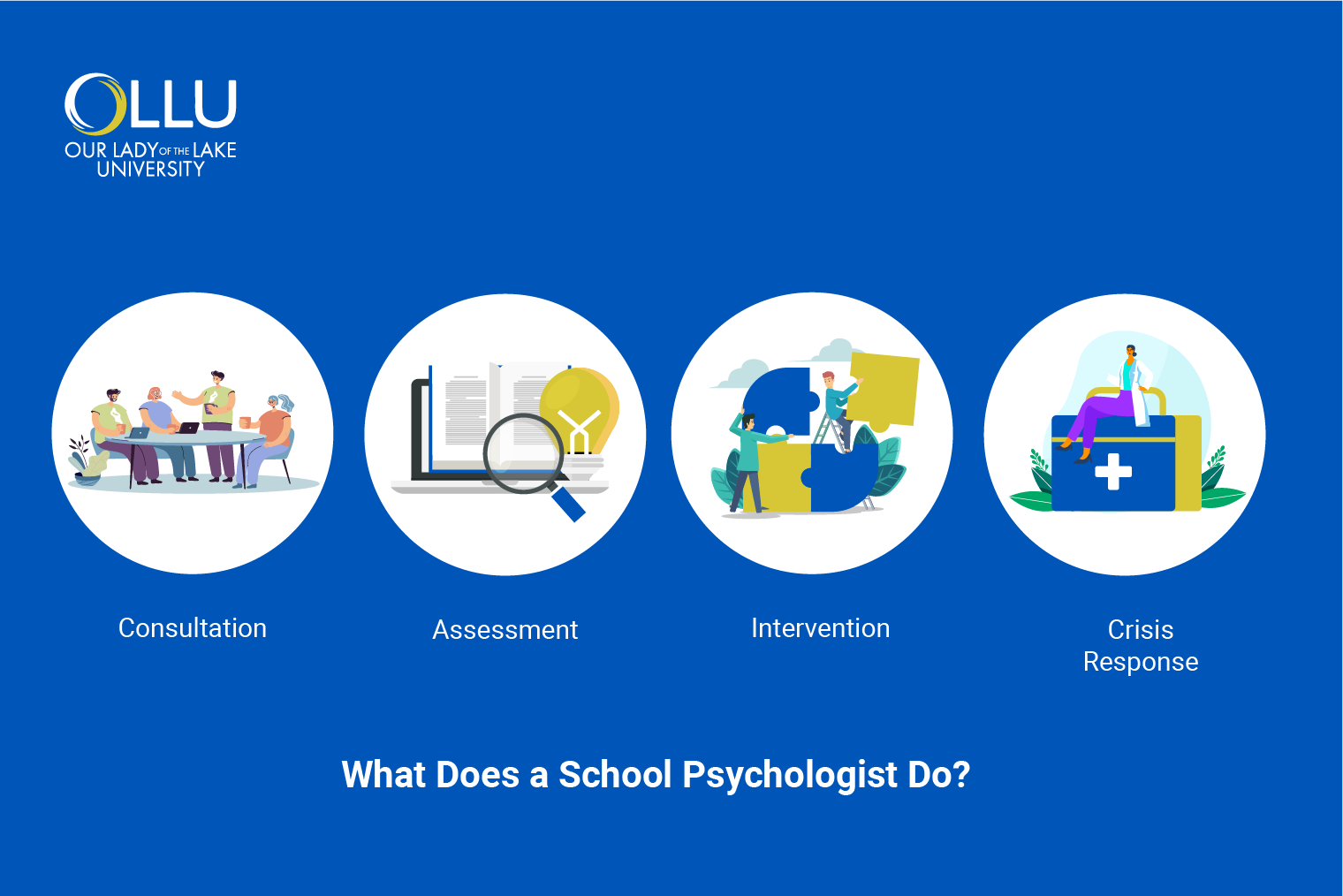What Does a School Psychologist Do?
Feb 21, 2024

School psychologists play a crucial role in educational environments, addressing the
diverse needs of students, educators, and families. As integral members of school
communities, they navigate the intricate intersection of psychology and education
to foster academic success and holistic well-being.
With a focus on understanding and supporting students' social, emotional, and educational
development, school psychologists employ a multifaceted approach to assessment, intervention,
consultation, and collaboration. Are you wondering, "What does a school psychologist
do?" Keep reading as we delve into the multifaceted responsibilities and the invaluable
contributions psychologists make to every student's educational journey. By understanding
the varied tasks of these professionals, we see how they help create successful learning
environments.
What Is a School Psychologist?
A school psychologist is a trained professional working in educational settings to support students' mental health and academic success. Their role encompasses various responsibilities, including assessing learning disabilities, behavioral issues, and emotional challenges. They collaborate with teachers, parents, and administrators to develop and implement strategies to address these issues.
School psychologists also provide counseling and intervention services to support students in managing social and emotional difficulties. They play a crucial role in promoting positive behavior and mental wellness within schools, helping to create an academic and emotional environment where students can thrive. Overall, school psychologists serve as advocates for the holistic well-being of students, working tirelessly to ensure they have the support they need to succeed in their educational journey.
What Does a School Psychologist Do?

A school psychologist undertakes a multitude of tasks essential for the well-being
and success of students in educational settings. These include consultation with teachers,
parents, and other stakeholders, assessment of students' psychological and educational
needs, intervention to address challenges, and response to crises. In the following
paragraphs, we will delve deeper into each of these duties to provide a comprehensive
understanding of the role of school psychologists.
Consultation
Consultation is a crucial aspect of a school psychologist's role, involving collaboration with teachers, parents, and other professionals to effectively address students' academic and emotional needs. School psychologists provide valuable expertise and support to educators by offering insights into student behavior, learning styles, and effective classroom management strategies. They work closely with teachers to develop individualized plans to support students struggling academically or behaviorally. Furthermore, they engage in constructive dialogue with parents, offering guidance on supporting their child's learning and well-being at home and school. By fostering strong partnerships with all stakeholders, school psychologists contribute to creating a supportive and conducive learning environment for every student.
Assessment and Evaluation
Assessment and evaluation are fundamental components of a school psychologist's toolkit, crucial for understanding and addressing students' cognitive, emotional, and behavioral functioning. Utilizing various methods and tools, school psychologists conduct comprehensive assessments to identify students' strengths, challenges, and areas needing support. These assessments may include standardized tests, observations, interviews, and behavioral assessments. By gathering data from multiple sources, school psychologists gain a holistic understanding of each student's unique needs and are able to make informed recommendations for intervention and support. Assessment and evaluation are essential in guiding decision-making processes within educational settings, ensuring that interventions are tailored to each student's needs.
Prevention and Intervention Programs
Prevention and intervention programs are essential for a school psychologist's role, aimed at addressing and mitigating various challenges students face in educational settings. School psychologists collaborate with school staff, parents, and community partners to develop and implement initiatives targeting issues such as bullying, substance abuse, and mental health challenges. These programs often involve educational workshops, awareness campaigns, and skill-building activities designed to promote positive behaviors and coping strategies among students. Additionally, school psychologists play a key role in identifying at-risk students and providing timely interventions to address their needs through individual counseling, group therapy, or referral to external resources. Prevention and intervention programs enhance all students' well-being and academic success by fostering a supportive and inclusive school environment.
Crisis Response
During times of crisis, such as natural disasters or incidents of violence, school psychologists play a critical role in providing support and interventions to students, staff, and the wider school community. They collaborate closely with school administrators and crisis response teams to develop and implement emergency protocols and provide psychological first aid to those affected. School psychologists offer counseling and emotional support to students who may be experiencing trauma or distress as a result of the crisis. They also work to address any heightened anxiety or fear within the school environment by providing reassurance and guidance on coping strategies.
School psychologists assist in coordinating support services and referrals for individuals requiring further assistance beyond the immediate crisis response. Through their expertise and compassion, school psychologists help to foster resilience and recovery within the school community during challenging times.
Where Do School Psychologists Work?
School psychologists work in various settings, supporting students' well-being and academic success. The most common setting is within public schools, where they collaborate with educators, administrators, and parents to address students' psychological and educational needs. School psychologists may also work in private schools, providing similar services to students in non-public educational settings. Educational agencies, such as state or local education departments, also employ school psychologists to develop and implement policies and programs to support student's mental health and academic achievement. Furthermore, school psychologists may work in specialized settings such as alternative schools, juvenile detention centers, or community mental health agencies, providing services to students with unique needs or circumstances. Overall, school psychologists are versatile professionals who can be found in various educational and community-based settings, all dedicated to fostering the well-being and success of students.
School Psychologist Qualifications
Aspiring school psychologists need to obtain education, licensure, and certification, gain practical experience, and develop essential skills to pursue a career in the field. Let's explore each of these qualifications in more detail.
Education
To become a school psychologist, individuals typically pursue a bachelor's degree in psychology or a related field, followed by a master's degree in school psychology. The master's program provides specialized training in child development, learning theories, and assessment techniques specific to educational settings. Coursework may cover behavioral intervention strategies, counseling techniques, and ethical considerations in school psychology practice. Some aspiring school psychologists may pursue a doctoral degree for advanced training and specialization in the field.
Licensure or Certification
Licensure and certification requirements for school psychologists vary by state. Still, most states require individuals to obtain a graduate degree in school psychology or a related field from an accredited program. Additionally, candidates typically need to complete several supervised internship hours and pass a standardized exam to obtain licensure. Some states may also require continuing education credits to maintain licensure. Aspiring school psychologists need to research the specific requirements of the state where they plan to practice.
Experience
Practical experience is essential for aspiring school psychologists to gain proficiency in their field. Many graduate programs in school psychology include supervised practicum placements and internships in educational settings, where students can apply their knowledge and skills under the guidance of experienced professionals. These hands-on experiences provide opportunities to work directly with students, conduct assessments, and collaborate with teachers and parents. Additionally, gaining experience through volunteer work or part-time employment in educational or mental health settings can further enhance a prospective school psychologist's skill set and understanding of the field.
Skills
Strong communication, empathy, and collaboration skills are essential for school psychologists to effectively support students, families, and colleagues. School psychologists must be able to communicate clearly and compassionately with students of all ages, as well as with parents, teachers, and other professionals involved in the educational process. Empathy is crucial for understanding and addressing students' diverse needs and experiences. Collaboration skills are essential for working as part of a multidisciplinary team to develop and implement intervention plans and support strategies. Additionally, school psychologists need strong problem-solving skills to address complex issues and adapt interventions to meet the individual needs of each student.
Salary and Job Outlook
According to data from the Bureau of Labor Statistics (BLS), the mean annual wage for school psychologists is $82,770. This figure reflects the average earnings of professionals in this field, who play a crucial role in supporting the well-being and academic success of students in educational settings. Regarding job outlook, the BLS projects a 6 percent growth in the overall employment of psychologists, including school psychologists, from 2022 to 2032. This growth indicates favorable prospects for individuals pursuing careers in school psychology, with increasing demand for their expertise expected in the coming years.
Bottom Line
The role of school psychologists is pivotal in nurturing thriving learning environments and promoting students' well-being and academic success. Through a combination of education, licensure, practical experience, and essential skills, school psychologists are equipped to address the diverse psychological and educational needs of students in educational settings. As advocates for student mental health and academic achievement, school psychologists play a vital role in fostering positive outcomes for students, families, and communities alike.
Frequently Asked Questions (FAQs):
What is the primary role of a school psychologist?
The primary role of a school psychologist is to support students' academic success, social-emotional development, and overall well-being in educational settings.
What is the difference between school counseling and school psychology?
School counseling primarily focuses on providing academic, career, and personal/social counseling to students. In contrast, school psychology has a broader scope, including psychological assessments, intervention planning, and addressing mental health concerns.
Is a school psychologist the same as a psychologist?
While both share a background in psychology, school psychologists specialize in educational settings, whereas psychologists may work in various settings beyond education.
What is a day in the life of a school psychologist?
A day in the life of a school psychologist typically involves:
- Conducting assessments
- Providing counseling and intervention services
- Collaborating with teachers and parents
- Attending meetings
- Engaging in professional development activities